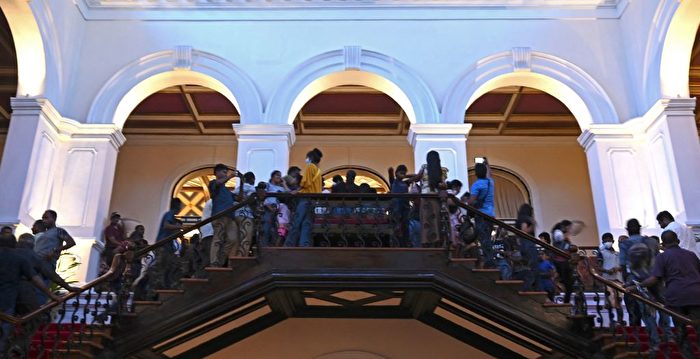[The Epoch Times, July 10, 2022](The Epoch Times reporter Xu Jian comprehensive report) The Sri Lankan government said late last month that the country’s economy has “collapsed” and it can no longer afford to buy food and fuel, not only without cash to pay for necessities import bills and default on huge debts and is seeking help from neighbouring countries as well as the International Monetary Fund.
Facing the anger of protesters, Sri Lankan President Gotabaya Rajapaksa and Prime Minister Ranil Wickremesinghe said on Saturday (July 9) that they would resign next week.
Sri Lankans are currently starving, queuing for hours to buy scarce fuel. It used to be a country with a fast-growing economy and a growing middle class. How is all this going?
How serious is this crisis?
The Sri Lankan government owes $51 billion in debt, unable to pay the loan interest, let alone repay the loan principal. Tourism, once an important engine of economic growth, has been hit by terrorist attacks and the pandemic. The country’s currency has lost 80 percent of its value, making imports more expensive, inflation has worsened and has gotten out of control, and the country’s food costs have risen by 57 percent, according to official data.
The country is on the brink of bankruptcy, with little money to import gasoline, milk, cooking gas and toilet paper.
Political corruption is also a deep-rooted problem, with powerful officials squandering wealth and complicating any financial bailout in Sri Lanka.
Anit Mukherjee, a policy fellow and economist at the Center for Global Development in Washington, said any aid from the International Monetary Fund or the World Bank should come with strict conditions to ensure that aid funds are not mismanaged.
Still, Mukherjee pointed out that Sri Lanka is on one of the busiest shipping lanes in the world, so a country of such strategic importance should not be allowed to collapse.
How are the Sri Lankans affected?
Tropical Sri Lanka usually has no shortage of food, but now people are starving. Nearly 9 out of 10 Sri Lankan families are saving food through diets such as eating less, while 3 million people are receiving emergency humanitarian aid, the UN World Food Programme said.
Local doctors turned to social media for help, hoping to secure supplies of critical equipment and medicines. More and more Sri Lankans are applying for passports and looking to go abroad to find work. Government workers were given extra “rest days” so they could grow their own food.
Why is the country’s economy in such a difficult position?
Economists say the crisis stems from years of mismanagement and corruption, among other factors.
Much of the country’s public anger has focused on President Rajapaksa and his brother, former Prime Minister Mahinda Rajapaksa. The latter resigned as prime minister in May after weeks of anti-government protests turned violent.
In 2019, suicide bombings at Easter churches and hotels killed more than 260 people and devastated tourism, a major source of foreign exchange. And during the pandemic, tourism has once again stalled.
Rajapaksa has pushed for the biggest tax cut in Sri Lanka’s history as foreign debt soars as Sri Lanka joins mega-Belt and Road infrastructure projects and the government needs to boost revenue. The tax cuts were forced to withdraw after creditors later downgraded Sri Lanka.
In April 2021, Rajapaksa suddenly banned the import of chemical fertilizers, saying that it would promote “organic agriculture”, which caught farmers by surprise, and the staple rice crop was greatly reduced, and food prices were further pushed up. Meanwhile, the war in Ukraine has pushed up food and oil prices. Inflation was close to 40% in May and food prices rose nearly 60%.
Responsible editor: Li Yuan #
